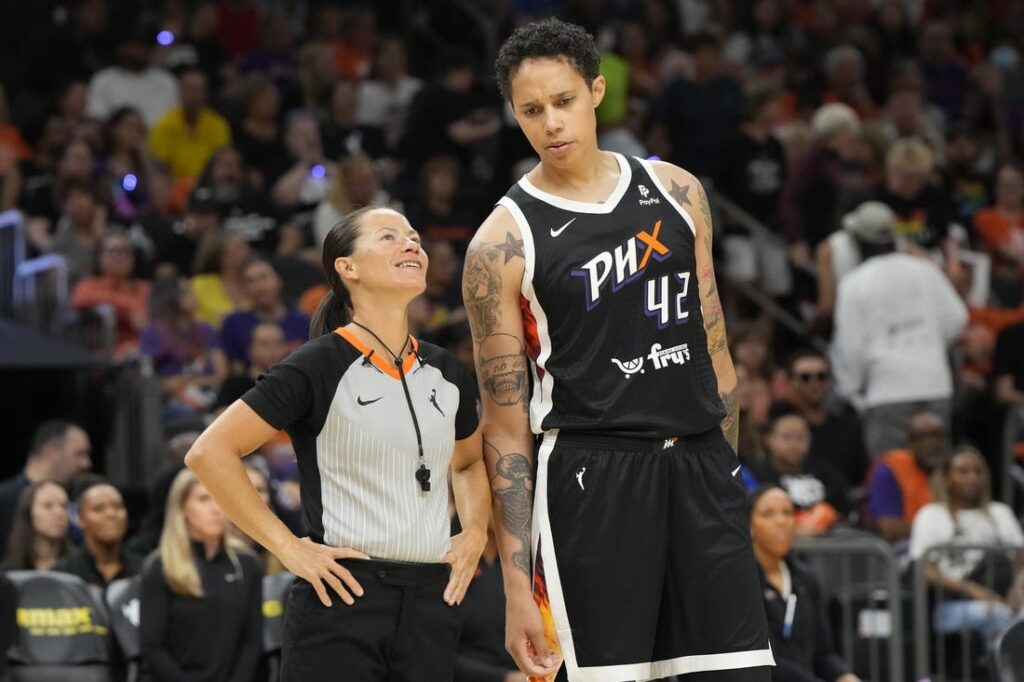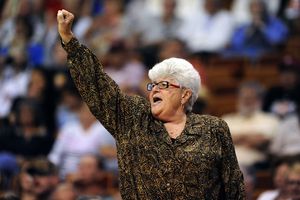A storm is brewing at the intersection of sports and patriotism — and it’s threatening to tear through the very heart of Team USA.
In a statement that shocked the WNBA and Olympic community alike, Lin Dunn, the General Manager of the Indiana Fever and one of the most respected veteran voices in women’s basketball, called for Brittney Griner’s immediate removal from the U.S. Olympic roster.
Her reason?
“You disrespect the anthem, you don’t deserve to wear the uniform.”
The words are bold. The intent is clear. The fallout? It’s just beginning.
🎯 The Flashpoint: A Sit, A Symbol, A Statement
Last Friday, in a pregame moment that would normally be routine, the national anthem played before the Phoenix Mercury’s matchup against the Indiana Fever. Every Fever player stood — including rookie sensation Caitlin Clark.
Griner remained seated. Alone. Head bowed. Expression unreadable.
It wasn’t the first time Griner has protested during the anthem — but this time, it hit differently.

Because the moment was caught live. Because the opponent was Clark. Because the arena was packed with first-time fans waving miniature American flags. Because Clark’s rise has become tied — fairly or not — to themes of patriotism, discipline, and Midwestern humility.
And so, when Griner sat, it felt like defiance — not just against a song, but against a wave of change in the sport.
🔥 Lin Dunn’s Full Statement: A Line Drawn
Hours after the game, Dunn — a former head coach, Olympic assistant, and Hall of Fame inductee — issued a personal statement to local Indiana press. But by Monday morning, it was picked up by every national outlet:
“I’ve spent my life building this league, standing beside these women, and defending their rights. But rights come with responsibilities. You kneel on your own time.
When you wear that jersey — when the flag goes up — you’re not speaking for yourself. You’re speaking for every American.And if you can’t stand for them…
Then you have no business standing on that podium.”
The crowd gasped — metaphorically, and online.
💣 Social Media Detonation: Support vs. Backlash
#ExpelGriner began trending within 30 minutes.
Conservatives, veterans, and large swaths of Middle America rushed to support Dunn.
Liberal commentators and activists called her remarks “outdated,” “xenophobic,” and “tone-deaf.”
Mainstream sports media? Mostly stunned silent — unsure how to cover the rapidly escalating narrative.
Quotes began flying across X (formerly Twitter):
“Lin Dunn just said what every Olympic fan is thinking.”
“This is fascism with a flag.”
“Standing for freedom shouldn’t require standing for a song.”
The divide was sharp. Personal. Emotional.
And growing.
🧨 Brittney Griner Responds: “I Know Who I Am”
In a measured statement released through her agent, Griner didn’t name Dunn, but made clear she would not be backing down:
“I’ve always stood — or sat — for what I believe in.
I love my country. I’ve risked my life for it, just not in the ways people want to package.
I’ll continue representing my country with pride — even if my pride looks different than yours.”
It was classic Griner — poised, unapologetic, layered in meaning.
But for many? It wasn’t enough.
🇺🇸 The Olympic Dilemma: Who Represents America?
With the Paris Olympics less than six weeks away, USA Basketball is suddenly under immense pressure to address the issue — both from within and without.
While Griner remains one of the most dominant centers in the world, officials are reportedly considering alternative options should the public backlash intensify.
“We’re watching this unfold like everyone else,” one Olympic committee member told Fox.
“But you can’t ignore public trust — not when it comes to wearing the red, white, and blue.”
Other names, like A’ja Wilson and Aliyah Boston, are already in the mix — and could slide into a larger role if Griner is benched.
🧭 Where Caitlin Clark Stands
Caitlin Clark has become the league’s most important figure — but she’s remained cautious, choosing not to comment directly on anthem protests or Dunn’s statement.
“I stand during the anthem because it feels right for me,” she said last month.
“But I respect anyone’s choice to express themselves peacefully.”
Yet her silence hasn’t protected her from being used as a symbol — for both sides.
To conservative fans, Clark is what they believe the league should be: disciplined, humble, non-political.
To others, her neutrality has made her complicit in what they view as a hostile takeover of the WNBA’s culture.
It’s an impossible tightrope. And she’s walking it daily.
🧠 A Historical Context: Protest vs. Patriotism
The Olympics are no stranger to political protest:
1968: Tommie Smith and John Carlos raised gloved fists during the anthem
1996: Mahmoud Abdul-Rauf refused to stand for the national anthem during NBA games
2021: U.S. track athlete Gwen Berry turned away from the flag on the podium
But Griner’s case is different.
Why?

Because she’s not just protesting — she’s doing it while under contract to represent the United States abroad.
And because she’s doing it in an era when every moment is recorded, shared, and dissected instantly.
📈 Sponsors React Quietly — But Watch Closely
Several sponsors — including Nike, AT&T, and Coca-Cola — have requested briefings on the situation, sources confirm.
None have pulled out. None have commented publicly.
But internally?
“No one wants their Olympic campaign overshadowed by culture war headlines,” said one agency executive.
“If this doesn’t resolve quickly, pressure will build.”
🔄 Public Sentiment: Realignment Underway
A new poll released by Morning Consult on Tuesday morning shows:
56% of U.S. adults agree Griner should be benched from the Olympic team
71% of Republicans, 62% of independents, and 29% of Democrats agree
Support for Clark as the “face of Team USA” now exceeds 74% among new WNBA viewers
This isn’t just about one player.
This is about who America roots for now.
🔚 Final Word: This Is Bigger Than Basketball
Lin Dunn’s call to action has made one thing clear:
The 2024 Olympics will not just be a showcase of athleticism — they’ll be a referendum on patriotism, identity, and freedom.
Brittney Griner believes she’s doing what’s right.
Lin Dunn believes she’s defending the country.
And Caitlin Clark?
She may be caught in the middle — but she’s also rising as the one person everyone’s watching.
The anthem may last 90 seconds.
But what it means — in 2025 — may echo for generations.
Brittney Griner and the Anthem Controversy: A Moment of Division in Sports, Patriotism, and Identity
The United States is no stranger to athletes using their platforms to protest social issues, but the latest controversy involving WNBA star Brittney Griner has reached new heights of tension and national discussion. In a stunning move that has left the sports world on edge, Griner, one of the league’s most dominant players, chose to remain seated during the national anthem before a recent game against the Indiana Fever. What seemed like a simple act of protest quickly evolved into a full-blown cultural flashpoint, with WNBA legends, fans, and media personalities divided over its meaning and impact.

This is where the story takes an unexpected turn: Lin Dunn, the General Manager of the Indiana Fever and a Hall of Fame coach, made a public statement calling for Griner’s removal from the U.S. Olympic roster. Dunn’s harsh words, which were aimed at both Griner’s protest and her perceived disrespect for the anthem, sent shockwaves through the sports community. “You disrespect the anthem, you don’t deserve to wear the uniform,” Dunn declared, not mincing words.
The Catalyst: A Simple Act of Protest Turns into a Political Firestorm
Griner’s decision to remain seated during the anthem was not an isolated incident. She has been an outspoken activist for social justice causes, particularly in the realms of racial equality and LGBTQ+ rights. Her protest was in line with many athletes who have used their platforms to make a statement about the country’s racial inequalities and the treatment of marginalized communities. Yet, the stakes were much higher this time.
The act of sitting during the anthem, while controversial in its own right, was further amplified because of the setting in which it occurred: a high-profile game in the WNBA, with a packed arena and millions of viewers across the globe. The moment was caught on camera and quickly disseminated across social media, where it quickly became the subject of an emotional and impassioned debate.
For many, it wasn’t just about Griner’s protest. It was about what she represented—an athlete who has spent years standing up for what she believes in, regardless of the backlash. For others, it was a condemnation of how patriotism and social justice movements are being framed in America today.
The Public Reaction: A Nation Divided
When Griner remained seated during the anthem, it sparked a firestorm of reactions on social media, where users across the political spectrum took to their keyboards to voice their opinions. For some, particularly in conservative circles, Griner’s act was a step too far. “This is disrespectful to the flag and to the men and women who fight for our country,” wrote one Twitter user. “If you can’t stand for the anthem, then you shouldn’t represent the country.”
On the flip side, Griner’s supporters praised her for taking a stand and refusing to conform to expectations. “Brittney is doing what so many athletes have done before her,” said one fan. “She’s using her platform to raise awareness for the issues that matter. This is what real activism looks like.”
As the debate raged on, many saw Griner’s protest as part of a larger societal divide—a divide that extends beyond sports and into the very core of America’s values. Was it about freedom of speech? Or was it about disrespecting symbols that some hold sacred? This tension has been brewing in sports for years, particularly in the NFL, where players like Colin Kaepernick famously kneeled during the national anthem to protest racial injustice.
Lin Dunn’s Call for Accountability: The Fallout for Griner
The response to Lin Dunn’s comments about Griner’s protest only added fuel to the fire. Dunn’s call for Griner’s removal from the U.S. Olympic roster went viral, quickly trending across social media. Dunn’s comments were seen by many as a clear condemnation of Griner’s actions, but others viewed it as a defense of the country’s values.
Dunn’s stance was not without its defenders. Many conservative figures rallied around her, claiming that Griner’s actions were an affront to American values. “Dunn is right—she should not be on the Olympic team if she can’t respect the anthem,” said one commentator. “It’s about representing the country, not your own personal agenda.”
However, the backlash against Dunn was swift. Progressive voices in the media and sports world accused her of attacking Griner’s right to peacefully protest. “This is not about disrespecting the flag—it’s about speaking out against injustices that have gone on for too long,” said sports commentator and activist Jemele Hill. “We cannot continue to silence athletes who are trying to use their voice for change.”
The Debate Over Patriotism, Protest, and the Future of the WNBA
As the debate surrounding Griner’s protest continues to unfold, questions remain about the future of the WNBA, and how it will handle the intersection of sports, politics, and activism. While some believe that Griner’s protest will bring attention to the systemic issues of racism and inequality, others argue that the league risks alienating fans who feel that politics should be kept out of sports.
“Sports should be a unifying force, not a platform for political statements,” said one conservative sports fan. “The WNBA risks losing its fanbase if it continues to let politics take center stage.”
On the other hand, supporters of the protest see it as a necessary step in the evolution of sports and activism. “Athletes have a platform, and they should use it to speak out against injustices,” said one social media user. “If the WNBA wants to be relevant, it needs to embrace activism and not shy away from these difficult conversations.”
The Future of Team USA: Will Griner Be Removed?
As the 2024 Olympics in Paris draw closer, the issue of who will represent Team USA in basketball remains unresolved. The debate over Griner’s protest, along with the growing controversy over her standing in the WNBA, has raised questions about her future with the national team. With some pushing for her removal, and others defending her right to protest, it remains to be seen whether Griner will take her place on the Olympic roster.
Inside the Olympic committee, officials are reportedly weighing their options. “We can’t ignore public opinion,” one committee member said. “But we also have to consider the integrity of the team and the values we represent.”
Meanwhile, figures like A’ja Wilson and Aliyah Boston are reportedly being considered as alternative options for the Olympic team should Griner’s situation not resolve in the coming months. The WNBA’s handling of this controversy may also have implications for future Olympic selections, with the public watching closely to see how the league navigates these complex issues.
The Growing Influence of Caitlin Clark
Caitlin Clark, a rising star in women’s basketball, has become a symbol of a more traditional approach to sportsmanship for many conservatives. While Clark has stayed relatively neutral on the issue of protests during the national anthem, her reputation for discipline, humility, and respect for the game has made her a focal point for fans who feel that the WNBA’s activism has gone too far.
“I stand for what I believe in, and I respect everyone’s right to express themselves,” Clark said in a recent interview. “But for me, standing during the anthem just feels right.”
While Clark has not publicly commented on the Griner controversy, her growing prominence in the sport has made her a central figure in the ongoing debate about the role of athletes in political movements. Whether Clark remains on the sidelines or becomes an active participant in this cultural divide remains to be seen, but her popularity continues to rise, making her one of the most important faces of women’s basketball in America.
Conclusion: The Battle for the Soul of Sports
The controversy surrounding Brittney Griner, Lin Dunn’s comments, and the broader debate over Pride Month and the intersection of sports and politics has revealed deep divisions in American society. At the heart of this conflict lies a question about the role of athletes and entertainers in shaping the cultural and political landscape.
As the WNBA and Olympic team face increasing scrutiny, the question of whether athletes should use their platforms for political expression or stick to their respective sports is more relevant than ever. For Griner, the fight is not just about basketball—it’s about standing up for what she believes in, no matter the cost. Whether she remains on Team USA, or if the WNBA finds itself torn apart by conflicting views, one thing is clear: the battle for the soul of sports is far from over.